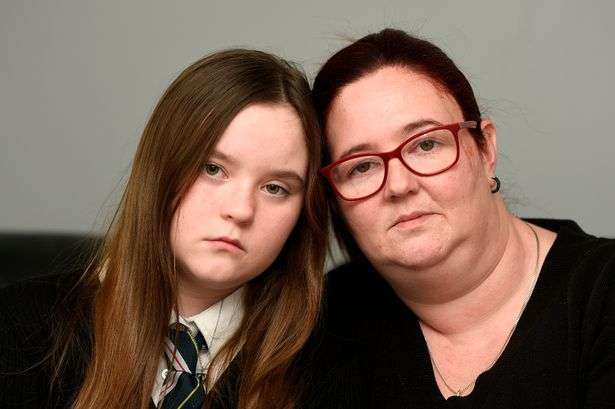The mother of a teenage girl who was taunted and viciously attacked on a bus ride home from school is advocating for a total prohibition on smartphones for children under 16-years-old.
Vicky Donald, whose 13-year-old daughter Kaylynn suffered severe mental and physical distress as a result of the disturbing assault in Ladybank, Fife, is championing for change. This follows a recent poll showing that the majority of parents believe the Government should enact laws forbidding the use of these devices by minors.
Vicky, a 36-year-old mother, urges the creation of safer mobile devices for children. This comes after a report by charity Parentkind showing more than four out of five parents (83%) think smartphones could potentially harm the younger generation. The charity is urging all political parties to consider the proposed ban in their manifestos for the upcoming general election.
This initiative follows several violent attacks perpetrated against children throughout the past year, with many of these acts documented through mobile phone recordings and subsequently circulated throughout the internet.
Vicky voiced her concern stating that youngsters are becoming engrossed with seeking validation through likes on social media, resulting in the neglect of ethical judgements, as evident in Kaylynn’s case. Instead of bystanders seeking help faced with such an incident, they instead chose to film and circulate the atrocity.
In Vicky’s view, smartphones provide young minds access to content that they’re not yet mature enough to handle. As such, these devices should be taken away from them. She also criticized the Government for laying the blame on parents, social media, and teachers instead of taking the initiative to protect the young ones.
Survey results from Parentkind, which saw the participation of 2,496 parents with kids in school, showed 58% of parents feeling the Government should enforce a ban on smartphones for those under 16-years-old. This sentiment is strongly echoed among primary school children’s parents, with more than 77% backing the smartphone ban.
The online survey, carried out over the past two months, found that almost nine out of ten parents (89%) were apprehensive about their children being exposed to online abuse and cyberbullying through smartphones, while 87% were concerned they could access detrimental content on the web. Despite these concerns, only 16% of parents with secondary school kids showed support for a full ban.
This new research coincides with Esther Ghey’s campaign for an age limit and stricter access control on social media apps use. Esther Ghey is the mother of the late Brianna Ghey, a teenager whose life was tragically taken. Vicky, whose daughter was subjected to violent assaults and unbearable trauma in her October 2022 attack, supports Esther’s cause.
Vicky is lobbying for the introduction of ‘under 16’ phones. These devices, currently exclusively available in the United States, do not facilitate access to social media or restricted content websites. One of the barriers to a phone ban Vicky encountered during a meeting with a local school headteacher was the integration of smartphones into school day-to-day activities, and how teachers rely on them for education.
An autistic schoolgirl in Glasgow, who was brutally beaten unconscious at a skatepark, has also voiced out her support for limiting phone access for under 16s. The assault on Abbie, who was just 12, sent her to the hospital for two days. It occurred merely three weeks prior to the attack on Kaylynn.
The assault was also recorded and subsequently spread among other youngsters. Abbie’s mother, Angela Jarvis, though appreciative of limited phone use for under 16s, drew the line at a total ban. In her view, a phone is paramount to a child’s safety and security.
Last week, the schools minister Damian Hinds expressed to MPs on the education select committee that owning a mobile phone has evolved into a custom for almost every child. More than half (53%) of parents polled in the latest survey stated feeling obliged to provide their kid with a smartphone at an age earlier than they would’ve preferred.
CEO of Parentkind, Jason Elsom, voiced his concerns about society becoming overly reliant on ‘electronic drugs’, leading to children falling victim to their digital enablers. He urged for the implementation of a smartphone ban in political party manifestos, which is already a call echoed by parents across the nation.
The UK Government maintains that despite the numerous benefits of technology and the opportunities they present for education and social interaction, these should not hamper a child’s safety. For this reason, the Government issued guidelines last month supporting teachers and creating a conducive learning environment. According to a spokesperson, the upcoming Online Safety Act will enforce platforms to adhere to age limits and protect children from accessing harmful content.
A representative from the Scottish Government emphasized that schools in Scotland should remain a safe environment conducive to learning, and any form of violence or maltreatment is not tolerated. Despite lacking the authority to enforce an outright ban on mobile phones in schools, they are in the process of implementing improved guidelines.
At the very core of this guidance, head teachers should have the freedom to enforce any necessary action, including restrictions on phone usage.












